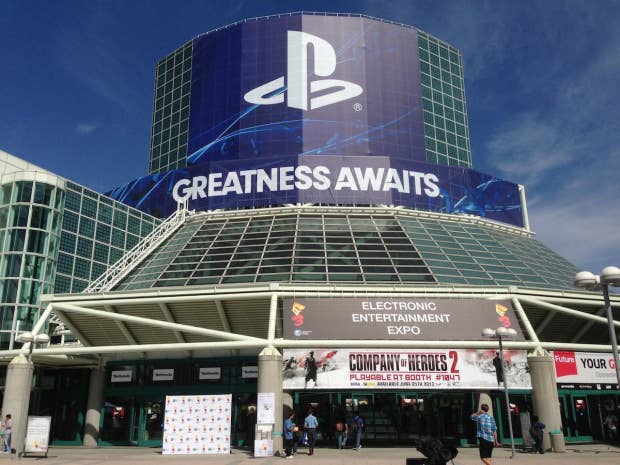Sony's PS5 marketing strategy does away with convention | Opinion
E3 absenteeism is just the latest example of a company paying little heed to conventional wisdom, but will that help or hurt it?
In the games industry, when something works, you do it again and again until it stops working. And sometimes you keep doing it even then.
With more than 100 million PS4s sold and a commanding lead over the Xbox One from start to finish this generation, it's fair to say that Sony's marketing plan for the system's launch worked, which is part of what makes Sony's announcement this week that it would be skipping E3 2020 so shocking.
While not entirely unprecedented -- Sony did skip E3 last year as well, after all -- this still represents a massive departure from what worked for the company heading into its last console launch, when the PS4 debuted directly opposite the Xbox One and soundly trounced the competition.
In fact, E3 2013 was perhaps Sony's single most impactful moment in the lead-up to the PlayStation 4 launch. The week before E3, Microsoft confirmed that Xbox One would require an online connection and give publishers the option to disallow second-hand sales of retail games by tying the disc to the first Xbox One that plays it, a massive anti-consumer shift away from the status quo. When Microsoft's press briefing came and went without that elephant being forcibly ejected from the room, Sony took advantage during its own press briefing the next day.
The announcement that the PS4 would have no restrictions on used games drew one of the biggest ovations of the conference. After all, there had been weeks of speculation that both the PS4 and Xbox One would institute new systems to profit off of second-hand game sales after Microsoft talked vaguely about online requirements at the Xbox One reveal. Players' concerns only grew as Microsoft dragged its heels to clarify its position and Sony stayed tight-lipped on the matter entirely, so what would have been non-news if revealed just a few months earlier -- that the PS4 would work exactly the same as every other major console in the industry's history -- was instead an E3 revelation, a haymaker to the competition delivered when the entire gaming world was watching.
As for the moment in Sony's E3 conference that might have drawn larger cheers, that would have been the reveal that the PS4 would retail for $399, $100 less than Microsoft's announced price point for the Xbox One.
These weren't the only reasons for negative perceptions around the Xbox One or positive perceptions around the PS4, but Sony's E3 2013 helped cement those perceptions and spread them throughout the consumer base. It put immediate and immense pressure on the competition to change course. Microsoft would abandon its Xbox One restrictions just a week after E3, deciding that a humiliating about-face was preferable to being the only console on the market with such policies in place.
Obviously, Sony returning to E3 wouldn't necessarily secure a replay of the last generation's events. For one thing, it doesn't appear Microsoft is going to be as cooperative about shooting itself in the foot this time around. And it's still possible that Sony could make a stir during E3 week with an EA Play-like event, something set in LA during the same time but not technically part of the big show. But it didn't do that last year, and if it follows suit this year, skipping E3 and letting Microsoft claim the spotlight for the week would be a bold and unconventional decision. It's also not the only decision Sony has made that deviates from what worked so well for it heading into the PS4 generation.
For example, the PS4 had a nine-month marketing build, which Sony kicked off with a February 20 briefing for press and investors in New York City.
This time around, Sony talked publicly about its next-gen console a year and a half in advance of launch, and not in a flashy media briefing but in an exclusive feature in Wired. In that feature, lead system architect Mark Cerny talked about some key features: a solid-state drive to cut down load times, 8K resolution support, and backward compatibility. Last October -- about a year ahead of launch -- Sony announced a holiday 2020 release window and again turned to Wired to reveal a few more features, like the new haptic feedback technology in the controller.
"It seems that whenever a platform-holder enjoys a banner generation, it starts to get a little unpredictably ambitious, often to its own detriment"
Instead of attending E3, Sony has said it will participate in "hundreds of consumer events across the globe" this year. That might sound like a lot, but between the various event sponsorships and promotional activities of every regional arm of the PlayStation business, I'm not convinced that indicates any substantial difference from its usual activities.
It's difficult to speculate too confidently on what Sony's game is here. To this point, many of its unorthodox promotional moves of late would fit into a general category of cost cutting you might expect to see from a less successful outfit. There was its absence from E3 last year and this year, the demise of the year-ending North American PlayStation Experience event that ran for most of this generation, the PS5 reveal coming through a website interview rather than a splashy media event. Sony may believe the PlayStation brand is so big it doesn't need to throw heaps of money at such endeavors -- it may even be right in that belief -- but this is not the expected behavior.
Although perhaps it should be. It seems that whenever a platform-holder enjoys a banner generation, it starts to get a little unpredictably ambitious, often to its own detriment. Microsoft's Xbox One debacle came on the heels of a resoundingly successful Xbox 360 generation. The damp squib that was the Wii U followed up Nintendo's mainstream phenomenon Wii. And of course, the last time Sony behaved this far outside of the norm was the last time it was coming off an industry-dominating success.
The end of the PlayStation 2 generation was the last time Sony was talking openly about the capabilities of its new system a year ahead of launch and drawing all kinds of raised eyebrows for it. Back then, the company was promising games that could run at 120 frames per second, saying a $599 price was "probably too cheap," and suggesting the "ideal" was to have consumers wanting to work more hours so they could afford it. Granted, those memorable moments all came courtesy of Ken Kutaragi, but even Kaz Hirai was out there talking about how being first to market wasn't a big deal even as the Xbox 360 was carving up Sony's market share during its year-long head-start on the generation.
To be clear, I don't expect the PS5 launch to be anything close to the debacle of the PS3 debut, where Sony slashed the Japanese price of the system by 20% before it even launched. There's plenty of time left before the PS5 launch, loads of details still unknown, and vitally, an entire lineup of games that need to be shown. And there's some evidence that what little the company has already done is working (5 million Instagram likes for a logo that was about as surprising as the PlayStation 5's name?!?), so who am I to criticize it?
That said, Sony's marketing decisions over the past couple years haven't always made the most sense. And with each step the company takes away from the conventional wisdom for launching a new console, I come back to last year's DICE Summit keynote address, where now-former Sony Interactive Entertainment Worldwide Studios chairman Shawn Layden talked about how the company's triumph in the PS2 era led directly to the "stark moment of hubris" that was the PS3 launch.
Perhaps I should be cheering an industry leader for throwing the conventional wisdom out the window. After all, this industry has a long tradition of great successes that came from doing just that. But this industry has a tradition just as long of industry leaders falling from lofty heights because they thought the conventional wisdom no longer applied to them.
CORRECTION: This article originally stated that Sony claimed the PS3 would be capable of 25.6 teraflops. Ken Kutaragi did make that claim, but only in regards to a cluster server of the Cell processors which powered the PS3.










